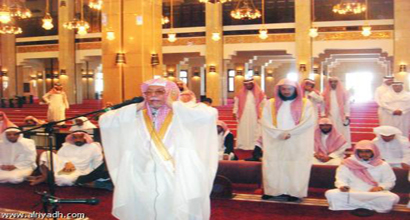
The Call to Prayer is an act of worship which precedes Prayer and as such is one of the most important religious ceremonies in Islam.
By: Muhammad Mahmoud As-Sawwaf
The Call to Prayer is the signal that the time for Prayer has begun. Through the use of prescribed words the Muslim community is summoned to attend Prayers which will lead to their prosperity in this life and in the Hereafter.
The Call to Prayer is itself an act of worship which precedes Prayer and as such is one of the most important religious ceremonies in Islam and the most widely recognized characteristic of the religion. It was introduced in the first year of Hijrah (emigration from Makkah) following which the Prophet Muhammad (peace be upon him) observed it night and day, whether at home or traveling. On no occasion until the day of his death was it known of him to break the custom, nor is there any known instance in which he granted a dispensation from the rule. The Companions continued to observe the rule until it became a duty – or the equivalent of a duty – because of the Prophet’s order which is preserved in a number of hadiths.
Description of the Call to Prayer
The Call to Prayer, according to the authentic hadiths, is as
follows:
“Allahu Akbar, Allahu Akbar, Allahu Akbar, Allahu Akbar”
Allah is the Greatest, Allah is the Greatest, Allah is the Greatest, Allah is the Greatest.
Ash-hadu alla ilaha illa-llah.
I bear witness that there is no god but Allah.
Ash-hadu alla ilaha illa-llah.
I bear witness that there is no god but Allah.
Ash-hadu anna Muhammadar-Rasulullah.
I bear witness that Muhammad is the Messenger of Allah.
Ash-hadu anna Muhammadar-Rasulullah.
I bear witness that Muhammad is the Messenger of Allah.
Hayya ‘ala-s-Salah, hayya ‘ala-s-Salah.
Come to Prayer, come to Prayer.
Hayya ‘ala-l-falah, hayya ‘ala-l-falah.
Come to prosperity, come to prosperity.
Allahu Akbar, Allahu Akbar.
Allah is the Greatest, Allah is the Greatest.
La ilaha illa-llah
There is no god but Allah.
In the Morning Prayer only, after saying “Come to prosperity”, the muezzin (one who calls the Adhan) says,
As-Salatu khairun min an-naum, As-Salatu khairun min an-naum.
“Prayer is better than sleep, Prayer is better than sleep.”
Then he continues with:
“Allah is the Greatest. Allah is the Greatest. There is no god but Allah.”
When you hear the sound of the Call to Prayer reverberating in the air, let your heart be filled with the magnificence of the Call and the Glory of Him in whose name the Call is made. Remember the prosperity and success to which you are summoned. Realize that apart from Allah, all great things are nothing. When you consider that there is something in the universe which is great, remember that Allah is the Greatest, Allah is the Greatest.
When you hear the muezzin give heed to him. Repeat what he says in your heart with all the power you possess until he says,
Hayya ‘ala-s-Salah, hayya ‘ala-l-falah.“Come to Prayer. Come to prosperity.”
Here say,
La hawla wa la quwwata illa billah. “There is no power and no strength except in Allah. There is no power and no strength except in Allah.”
Listen to the hadith of the Messenger of Allah (peace be upon him) as related by Muslim in which he said, “When the muezzin says: Allah is the Greatest, Allah is the Greatest, and one of you should make this response: Allah is the Greatest, Allah is the Greatest; (and when the muezzin) says: I testify that there is no god but Allah, one should respond: I testify that there is no god but Allah, and when he says: I testify that Muhammad is the Messenger of Allah, one should make a response: I testify that Muhammad is Allah’s Messenger. When he (the muezzin) says: Come to Prayer, one should make a response: There is no might and no power except with Allah. When he (the muezzin) says: Come to prosperity, one should respond: There is no might and no power except with Allah, and when he (the muezzin) says: Allah is the Greatest, Allah is the Greatest, then make a response: Allah is the Greatest, Allah is the Greatest. When he (the muezzin) says: There is no god but Allah, and he who makes a response from the heart: There is no god but Allah, he will enter Paradise.” (Muslim)
When you finish answering the muezzin, ask the blessing of Allah for the Prophet. Then request Allah’s favor for him in the words of the traditional private Prayer. Turn your mind to the humility of the Messenger (peace be upon him). He calls on his people to bless him and entreat Allah to grant His favor to him after each Call to Prayer so that mankind will turn to Allah, and Allah alone, and learn that all things are for Allah to do as He wishes and as He chooses, for man, no matter how exalted his rank or authority is, a servant of the Compassionate, the Merciful, of Whom he is always in need.
`Abdullah ibn `Umar (may Allah be pleased with them) said that he had heard the Messenger of Allah (peace be upon him) say, “When you hear the muezzin, repeat what he says, then invoke a blessing on me, for everyone who invokes a blessing on me will receive ten blessings from Allah; then beg from Allah Al-Wasilah for me, which is a rank in Paradise fitting for only one of Allah’s servants, and I hope that I may be that one. If anyone who asks that I be given Al-Wasilah, he will be assured of my intercession.” (Muslim)
The preferable supplication which is said after each Call to Prayer is that which our Prophet has taught us:
Allahumma rabba hadhihi-d-da‘awati-t-tammati wa-s-Salati-l-qa’imati, ati Muhammadan il-wasilata wa-l-fadilata wa-d-darajata-r-rafi‘ati wa-b‘ath-hu maqamam mahmudan illadhi wa‘adtahu.“0 Allah, Lord of all supplications and steadfast Prayer! Grant Muhammad the most favored and excellent position. Admit him to the praiseworthy place that You have promised him.”
______________________________________________
Source: Quoted with slight modifications from the author’s “The Muslim Prayer Book: Rules, Concepts & Merits.”
[opic_orginalurl]

